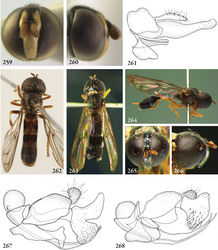Paramicrodon
| Notice: | This page is derived from the original publication listed below, whose author(s) should always be credited. Further contributors may edit and improve the content of this page and, consequently, need to be credited as well (see page history). Any assessment of factual correctness requires a careful review of the original article as well as of subsequent contributions.
If you are uncertain whether your planned contribution is correct or not, we suggest that you use the associated discussion page instead of editing the page directly. This page should be cited as follows (rationale):
Citation formats to copy and paste
BibTeX: @article{Reemer2013ZooKeys288, RIS/ Endnote: TY - JOUR Wikipedia/ Citizendium: <ref name="Reemer2013ZooKeys288">{{Citation See also the citation download page at the journal. |
Ordo: Diptera
Familia: Syrphidae
Name
Paramicrodon de Meijere – Wikispecies link – Pensoft Profile
- Paramicrodon de Meijere, 1913: 359. Type species: Paramicrodon lorentzi Meijere, 1913: 360, by monotypy.
- Syrphinella Hervé-Bazin, 1926: 73. Type species: Syrphinella miranda Hervé-Bazin, 1926: 74, by monotypy.
- Myxogasteroides Shiraki, 1930: 9. Type species: Myxogaster nigripennis Sack, 1922: 275, by original designation.
- Nannomyrmecomyia Hull, 1945: 75. Type species: Paramicrodon delicatulus Hull, 1937: 24, by original designation. Described as subgenus of Spheginobaccha.
Description
Body length: 4–11 mm. Small, slender flies with short antennae and more or less parallel-sided abdomen. Head slightly wider than thorax. Face convex; narrower than an eye. Lateral oral margins not produced. Vertex flat. Occiput ventrally narrow, dorsally strongly widened. Eye bare. Eye margins in male only slightly converging at level of frons, with mutual distance 1.5-2.5 times as large as width of antennal fossa. Antennal fossa about as wide as high. Antenna shorter than distance between antennal fossa and anterior oral margin; basoflagellomere longer than scape, oval, about 1.5 times as long as wide, bare. Postpronotum pilose. Scutellum semicircular; without calcars. Anepisternum convex; pilose anteriorly and posteriorly, widely bare in between. Anepimeron entirely pilose. Katepimeron convex; bare. Wing: vein R4+5 without posterior appendix; vein M1 straight, perpendicular to vein R4+5; postero-apical corner of cell r4+5 rectangular, with small appendix; crossvein r-m located within basal 1/10 of cell dm. Abdomen elongate: more or less parallel-sided, may be subtly constricted at tergite 3 (male), or slightly oval (female); 2.5–4 times as long as wide. Tergites 3 and 4 fused (but distinct suture visible). Sternite 1 bare or pilose. Sternites 3-4 strongly narrowed; narrower than sternite 2, with wide membraneous parts laterally. Male genitalia: phallus furcate near apex, slightly bent dorsad, projecting well beyond apex of hypandrium; hypandrium with apical part consisting of two separate lobes; epandrium without ventrolateral ridge; surstylus of varying shape.
Diagnosis
Vein R4+5 without posterior appendix. Postpronotum pilose. Antenna shorter than distance between antennal fossa and anterior oral margin. Vein M1 straight, not parallel to wing margin, perpendicular to both vein R4+5 and M. Mesonotum with transverse suture incomplete. Sternites 3-4 strongly narrowed; narrower than sternite 2, with wide membraneous parts laterally.
Discussion
The synonymy of Syrphinella Hervé-Bazin, 1926 with Paramicrodon was suspected by Hull (1937a)[1] and stated explicitly by Hull (1949)[2]. This subjective synonymy is here confirmed, based on examination of the type specimen of the type species. Myxogasteroides Shiraki, 1930 was treated as a synonym of Paramicrodon by Hull (1949)[2] and Cheng and Thompson (2008)[3], a synonymy followed here based on the description of the type species. The synonymy of Nannomyrmecomyia Hull, 1945 and Paramicrodon was stated by Thompson (1969[4], 1981a) and is also confirmed here based on examination of the type specimens.
Diversity and distribution
Described species: 8. The range of this genus is interestingly disjunct, with six species from the Oriental Region (Thailand to Moluccas), one from New Guinea and two from the Neotropical region. At least one additional species occurs in the Neotropical region (unpublished observations by the first author), but more species-level work is needed to sort this out.
Taxon Treatment
- Reemer, M; Ståhls, G; 2013: Generic revision and species classification of the Microdontinae (Diptera, Syrphidae) ZooKeys, 288: 1-213. doi
Other References
- ↑ Hull F (1937a) New species of exotic syrphid flies. Psyche 44: 12-32. doi: 10.1155/1937/46960
- ↑ 2.0 2.1 Hull F (1949) The morphology and inter-relationships of the genera of syrphid flies, recent and fossil. Transactions of the Zoological Society 26: 257-408. doi: 10.1111/j.1096-3642.1949.tb00224.x
- ↑ Cheng X, Thompson F (2008) A generic conspectus of the Microdontinae (Diptera: Syrphidae) with the description of two new genera from Africa and China. Zootaxa 1879: 21-48.
- ↑ Thompson F (1969) A new genus of Microdontine flies (Diptera: Syrphidae) with notes on the placement of the subfamily. Psyche 76: 74-85. doi: 10.1155/1969/62102
Images
|
